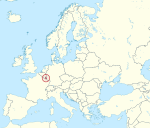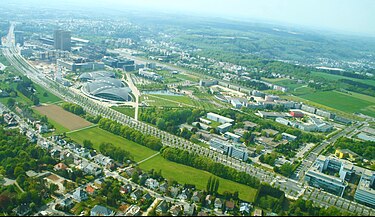
Back بوابة:لوكسمبورغ Arabic Портал:Люксембург Bulgarian Portál:Lucembursko Czech Portal:Luxemburg German Portal:Luxemburgo Spanish Portail:Luxembourg French Portale:Lussemburgo Italian Portal:Lëtzebuerg LB Portaal:Luxemburg Dutch Portal:Luxemburgo Portuguese
The Luxembourg Portal
Luxembourg (/ˈlʌksəmbɜːrɡ/ ⓘ LUK-səm-burg; Luxembourgish: Lëtzebuerg [ˈlətsəbuəɕ] ⓘ; German: Luxemburg [ˈlʊksm̩bʊʁk] ⓘ; French: Luxembourg [lyksɑ̃buʁ] ⓘ), officially the Grand Duchy of Luxembourg, is a small landlocked country in Western Europe. It is bordered by Belgium to the west and north, Germany to the east, and France to the south. Its capital and most populous city, Luxembourg, is one of the four institutional seats of the European Union (together with Brussels, Frankfurt, and Strasbourg) and the seat of several EU institutions, notably the Court of Justice of the European Union, the highest judicial authority. Luxembourg's culture, people, and languages are highly intertwined with its French and German neighbors; while Luxembourgish is the only national language of the Luxembourgish people and of the Grand Duchy of Luxembourg, French is the only language for legislation, and all three – Luxembourgish, German and French – are used for administrative matters in the country. With an area of 2,586 square kilometers (998 sq mi), Luxembourg is Europe's seventh-smallest country. In 2024, it had a population of 672,050, which makes it one of the least-populated countries in Europe, albeit with the highest population growth rate; foreigners account for nearly half the population. Luxembourg is a representative democracy headed by a constitutional monarch, Grand Duke Henri, making it the world's only remaining sovereign grand duchy. Luxembourg is a developed country with an advanced economy and one of the world's highest GDP (PPP) per capita as per IMF and World Bank estimates. The nation's levels of human development and LGBT equality are ranked among the highest in Europe. The historic city including its fortification was declared a UNESCO World Heritage Site in 1994 due to the exceptional preservation of its vast fortifications and historic quarters. Luxembourg is a founding member of the European Union, OECD, the United Nations, NATO, and the Benelux. It served on the United Nations Security Council for the first time in 2013 and 2014. (Full article...) Selected article - From August 1914 until the end of World War I on 11 November 1918, the Grand Duchy of Luxembourg was under full occupation by the German Empire. The German government justified the occupation by citing the need to support their armies in neighbouring France, although many Luxembourgers, past and present, have interpreted German actions otherwise. During this period, Luxembourg was allowed to retain its own government and political system, but all proceedings were overshadowed by the German army's presence. Despite the overbearing distraction of the occupation, the Luxembourgish people attempted to lead their lives as normally as possible. The political parties attempted to focus on other matters, such as the economy, education, and constitutional reform. (Full article...)General imagesThe following are images from various Luxembourg-related articles on Wikipedia.
Luxembourg News
CategoriesTopicsSelected pictureAerial view of the lower Kirchberg area in Luxembourg, with the University of Luxembourg – Kirchberg Campus in the center.
Related PortalsThings you can doAssociated WikimediaThe following Wikimedia Foundation sister projects provide more on this subject:
Discover Wikipedia using portals | ||||
© MMXXIII Rich X Search. We shall prevail. All rights reserved. Rich X Search



































